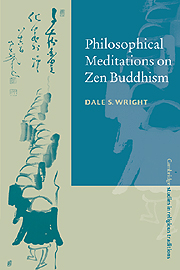Book contents
- Frontmatter
- Contents
- Introduction
- 1 TEXTUALITY: the “dependent origination” of Huang Po
- 2 READING: the practice of insight
- 3 UNDERSTANDING: the context of enlightenment
- 4 LANGUAGE: the sphere of immediacy
- 5 RHETORIC: the instrument of mediation
- 6 HISTORY: the genealogy of mind
- 7 FREEDOM: the practice of constraint
- 8 TRANSCENDENCE: “going beyond” Huang Po
- 9 MIND: the “Great Matter” of Zen
- 10 ENLIGHTENMENT: the awakening of mind
- CONCLUSION: Zen in theory and practice
- Bibliography
- Index
7 - FREEDOM: the practice of constraint
Published online by Cambridge University Press: 12 November 2009
- Frontmatter
- Contents
- Introduction
- 1 TEXTUALITY: the “dependent origination” of Huang Po
- 2 READING: the practice of insight
- 3 UNDERSTANDING: the context of enlightenment
- 4 LANGUAGE: the sphere of immediacy
- 5 RHETORIC: the instrument of mediation
- 6 HISTORY: the genealogy of mind
- 7 FREEDOM: the practice of constraint
- 8 TRANSCENDENCE: “going beyond” Huang Po
- 9 MIND: the “Great Matter” of Zen
- 10 ENLIGHTENMENT: the awakening of mind
- CONCLUSION: Zen in theory and practice
- Bibliography
- Index
Summary
One must not act as one pleases … One must submit to all the restrictions.
Pure Regulations of ZenThe master said to the assembly: “When the great function works, it does not follow rules.”
Transmission of the LampThe obvious tension between the images of Zen contained in the two quotes above provides an intriguing entrance into our theme in this chapter. On the one hand, a thorough reading of Zen literature will disclose the prominence given in the tradition to regulation, hierarchy, authority, and constraint. Living in a Zen monastery requires a thorough-going renunciation of many dimensions of freedom. On the other hand, we can see that Zen masters were widely thought to be rule breakers, free-spirited individuals whose “awakening” enabled them to laugh uproariously in the face of normal social constraint. So, which is the “real” Zen? Or if both images are true to the Zen tradition, how are they to be reconciled?
Freedom is an issue of considerable importance in Zen, and an issue that has been at the forefront of western interpretations of Zen since the very beginning. The background to our interest in this issue is the obvious prominence of “freedom” as a symbol in modern western thought. Western minds, already attuned to the significance of “freedom,” have been particularly attracted to this side of Zen.
Writing in the 1970s, and looking back over the brief history of western encounter with “Zen,” John Blofeld, by then one of the best known “transmitters” of Buddhism to the west, could see that “The recent widespread Western interest in Ch'an (Zen) owes much to the appeal of … unconventional ‘shock tactics’ and alsoto the sect's seeming iconoclasm…
- Type
- Chapter
- Information
- Philosophical Meditations on Zen Buddhism , pp. 119 - 138Publisher: Cambridge University PressPrint publication year: 1998

